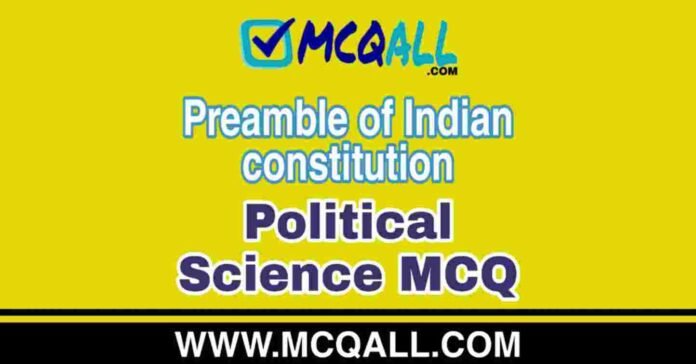Preamble of Indian constitution – Political Science MCQ Question and Answer
Preamble of Indian constitution – Political Science MCQ Question and Answer : Preamble of Indian constitution – Political Science MCQ Question and Answer is given below. This Preamble of Indian constitution – Political Science MCQ / Preamble of Indian constitution – Political Science Quiz / Preamble of Indian constitution – Political Science Question and Answer / Preamble of Indian constitution – Political Science Multiple Choice Question, Short Question, Question and Answer, Suggestion, Notes are very important for school, college and various competitive or job exams and interviews.
Those of you who are looking for Preamble of Indian constitution – Political Science MCQ Question and Answer, can read the questions and answers given below.
Preamble of Indian constitution – Political Science MCQ
- In which case, Supreme Court held that Preamble is integral part of the constitution?
(A) SR Bommai Case
(B) Kesavanand Bharti Case
(C) Ashok Kumar Thakur Case
(D) M C Mehta Case
Answer : B
Solution: In the Kesavananda Bharati case (1973), the Supreme Court rejected the earlier opinion (in the Berubari Case) and held that the Preamble is a part of the Constitution.
- Which among the following term correctly represents the Zonal Councils?
(A) Advisory Bodies
(B) Actually Working Bodies
(C) Law Making authorities
(D) Administrative Bodies
Answer : A
Solution: Zonal Councils are statutory and advisory bodies.
- Freedom of Press is implicit under which article of Constitution of India?
(A) Article 19
(B) Article 20
(C) Article 21
(D) Article 22
Answer : A
Solution: Freedom of Press flows from Article 19 (1) as freedom of speech and expression.
- Which article of the Indian Constitution says that directive principles are not enforceable by any court?
(A) Article 36
(B) Article 37
(C) Article 38
(D) Article 39
Answer : B
Solution: Describing the nature of DPSP, Article 37 says that directive principles are not enforceable by any court.
- Which Constitutional Amendment gave Right to Education to children in India?
(A) 86th
(B) 90th
(C) 91st
(D) 97th
Answer : A
Solution: Constitution (86th) Amendment Act, 2002 made elementary education a fundamental right in India.
- In which year Manipur and Tripura became full-fledged state of India?
(A) 1962
(B) 1968
(C) 1972
(D) 1980
Answer : C
Solution: Tripura, Manipur, and Meghalaya became full-fledged states of India on 21 January, 1972, under the North Eastern Region (Re-organisation) Act, 1971.
- The constitution of India derives its ultimate authority from ____?
(A) Supreme Court of India
(B) Parliament of India
(C) People of India
(D) Constituent Assembly of India
Answer : C
Solution: The Constitution draws its authority from the people and has been promulgated in the name of the people. This is evident from the Preamble which states “We the people of India …. do hereby adopt, enact and give to ourselves this Constitution.”
- Riksdag is the name of parliament of which of the following?
(A) Iran
(B) Norway
(C) Sweden
(D) Kazakhstan
Answer : C
Solution: The Riksdag is the national legislature and the supreme decision-making body of the government of Sweden.
- Till now, the Preamble of Constitution of India has been amended for how many times?
(A) Never
(B) Once
(C) Twice
(D) Thrice
Answer : B
Solution: Preamble can be amended by Parliament using its amendment powers as per article 368. We note here that preamble has been amended only once so far through the 42nd Constitution Amendment Act 1976. The words Secular, Socialist and Integrity were added to the constitution.
- Which of the following is NOT a correct statement with respect to Freedom of speech and expression in India?
(A) It is enshrined in Part III of the Constitution
(B) It is not an absolute right to express ones thoughts freely
(C) It can not be curtailed by legislation
(D) It can be suspended in emergency
Answer : C
Solution: Since this right is not absolute, it can be curtailed by legislation by parliament. During emergency, Article 19 is eclipsed by the superior right of the State to enact laws abrogating freedoms of a citizen (under Article 358).
Political Science MCQ Question and Answer
See also: – Political Science MCQ Question and Answer Click Here
Preamble of Indian constitution – Political Science MCQ Question and Answer
Preamble of Indian constitution – Political Science MCQ Question and Answer: Preamble of Indian constitution – Political Science MCQ Question and Answer – Preamble of Indian constitution – Political Science MCQ Question and Answer has been discussed above.
Preamble of Indian constitution – Political Science Multiple Choice Question and Answer
Preamble of Indian constitution – Political Science Multiple Choice Question and Answer: Preamble of Indian constitution – Political Science Multiple Choice Question and Answer – Preamble of Indian constitution – Political Science Multiple Choice Question and Answer discussed above.
Preamble of Indian constitution – Political Science Quiz
Preamble of Indian constitution – Political Science Quiz : Preamble of Indian constitution – Political Science Quiz – Preamble of Indian constitution – Political Science Quiz Question and Answer has been discussed above.
Preamble of Indian constitution – Political Science Question and Answer in English
Preamble of Indian constitution – Political Science Question and Answer in English: Preamble of Indian constitution – Political Science Question and Answer in English – Preamble of Indian constitution – Political Science Question and Answer in English.
Preamble of Indian constitution – Political Science MCQ Question and Answer
If you benefit from this “Preamble of Indian constitution – Political Science MCQ Question and Answer” post then our efforts will be successful. Also visit our MCQALL.COM website or follow us on various social networking sites (Telegram, Facebook, Youtube, Instagram, Twitter) to know MCQ – Multiple Choice Question Quiz on various topics, questions and answers quiz from GK and Daily Current Affairs. Thank you.












